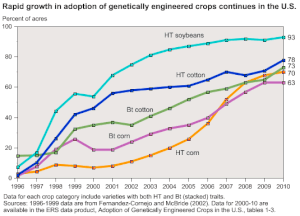
The trouble with some of the miracles of science is that we discover some wonderful substance and start manipulating it in the belief we know what we’re doing, only to find out at some later date that the substance in question—in this case, nitric oxide—does not, in fact, perform its magic all by itself.
A recent study reports that hydrogen sulfide (H2S), which was thought to perform on its own certain functions similar to those of nitric oxide (NO), is actually a partner with NO in such actions as growing new blood vessels and relaxing existing ones. The authors of the study were Greek and American scientists, and the report is published in the Proceedings of the National Academy of Sciences of the United States of America.

The only conclusion I can reach is that these researchers were surprised by this discovery. Which makes me wonder. How can we use nanotechnology for a myriad of purposes and gaily go about genetically modifying foods and so on without having done enough safety studies? What surprise “partnerships” might we be missing/ignoring? And if we’re missing something, anything, what long-term effects will, for example, the genetically modified foods have on the nutrition—and therefore growth and health—of the animals and humans consuming them?
I served recently on a small panel of ordinary citizens being questioned by food industry representatives. The topic was attitudes about food safety and food labeling. What kind of labels did we think would make us feel confident about a food? I ask you: if you read “This is really good for you!” on a package, how much do you believe that? How often do you trust that “free range” really means the chickens didn’t spend most of their lives crammed together on top of each other in cages? And does “organic” broccoli mean they used compost from the kitchen in the dirt but still sprayed the hell out of it with pesticides? The truth is often a crapshoot
Some panelists thought they’d trust a source of foods–like Trader Joe’s or Whole Foods–more than they’d trust the marketing language of the manufacturer. The assumption being that these large, consumer-friendly stores that talk big about wholesome and healthy have actually done some serious investigating before they decided to carry a certain brand.
When it comes to nanotech in medicine, I’m sure that if a medicine could be nano-power-injected in me that would save my life—even for a while—I’d say hurry up and shoot, man. But it’s a different story when we talk about using it to fight cancer in a small child where we don’t know what the long-term consequences may be of nanoparticles injected into the body.
No Luddites here. Thank God for every exciting step forward in science—and equal gratitude for those who urge balance and caution.
